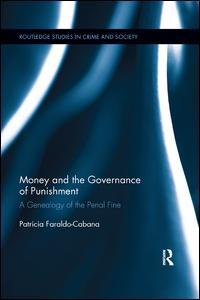Description
Money and the Governance of Punishment
A Genealogy of the Penal Fine
Routledge Studies in Crime and Society Series
Author: Cabana Patricia
Language: English
Subjects for Money and the Governance of Punishment:
Keywords
Short Term Prison Sentences; Sociology of punishment; Offender’s Financial Circumstances; Philosophy of punishment; Fine Defaulters; Penology; West Germany; Financial sanctions; Unpaid Fine; Monetization of justice; Short Term Imprisonment; The Currency of Justice; German Imperial Penal Code; Patricia Faraldo-Cabana; Offender’s Wealth; 7th International Penal; Pecuniary Punishment; Criminal Law Reform Act; Subsidiary Imprisonment; Intermediate Punishments; Subsidiary Penalty; Penal Fine; Daily Unit; Offender’s Means; Intermediate Sanctions; Unit Fine System; Spanish Constitutional Court; Von Liszt; Offender’s Death; De Las Penas; German Supreme Federal Court; Wirtschaft Und Statistik
Approximative price 53.83 €
In Print (Delivery period: 14 days).
Add to cartPublication date: 03-2019
· 15.6x23.4 cm · Paperback
Approximative price 160.25 €
In Print (Delivery period: 14 days).
Add to cartPublication date: 05-2017
· 15.6x23.4 cm · Hardback
Description
/li>Contents
/li>Readership
/li>Biography
/li>
Money is the most frequently means used in the legal system to punish and regulate. Monetary penalties outnumber all other sanctions delivered by criminal justice in many jurisdictions, imprisonment included. More people pay fines than go to prison and in some jurisdictions many of those in prison are there because of failure to pay their fines. Therefore, it is surprising how little has been written in the Anglophone academic world about the nature of money sanctions and their specific characteristics as legal sanctions.
In many ways, legal innovations related to money sanctions have been poorly understood. This book argues that they are a direct consequence of the changing meaning of money. Considering the ?meaninglessness? of modern money, the book aims to examine the history of changing conceptions in how fines have been conceived and used. Using a set of interpretative techniques sensitive to how money and freedom are perceived, the genealogy of the penal fine is presented as a story of constant reformulation in response to shifting political pressures and changes in intellectual developments that influenced ideological commitments of legislators and practitioners.
This book is multi-disciplinary and will appeal to those engaged with criminology, sociology and philosophy of punishment, socio-legal studies, and criminal law.
Preface
1. Making offenders pay
2. The fine as the ideal penal sanction in the age of the Enlightenment
3. The impersonality of money: why and how fines paid by an innocent third party were prohibited
4. The unequal distribution of money and the (un)fairness of fines: why and how fines were made affordable
5. The expansion of the fine in the twentieth century
6. The triumph of the day-fine system? National perspectives and comparative approaches
7. What next?
Patricia Faraldo Cabana is Professor for Criminal Law at the University of A Coruña, in Spain, and Adjunct Professor at the Queensland University of Technology in Brisbane, Australia
These books may interest you

Prison in IranA Known Unknown 126.59 €



